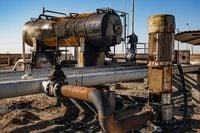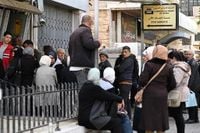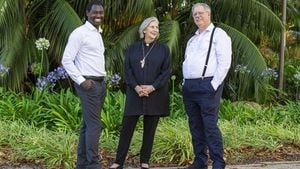The United Nations Development Program (UNDP) is set to deliver a significant financial aid package of $1.3 billion over the next three years to support war-torn Syria, focusing on rebuilding infrastructure and fostering digital start-ups. Abdallah Dardari, the UNDP assistant secretary-general, emphasized that investing in Syria is viewed as a "global public good." In a recent interview with Reuters in Damascus, Dardari detailed that the comprehensive strategy aims to cover various aspects of support, including the introduction of artificial intelligence, the establishment of social protection programs, and extensive infrastructure repairs.
He stated, "Our total plan for Syria over three years is $1.3 billion. This is not just a number, but a comprehensive strategy covering all support aspects." Dardari highlighted the necessity of mobilizing funds from multiple sources, including the World Bank, the International Monetary Fund (IMF), and other regional countries, to achieve these ambitious goals.
The backdrop of this initiative is the recent political upheaval in Syria, where former leader Bashar al-Assad was ousted in December 2024 following a rebel offensive. His departure marked the end of a nearly 14-year civil war, leaving a power vacuum and a desperate need for international assistance. The new authorities have since urged the global community to lift the sanctions imposed during Assad's regime. However, these sanctions remain largely intact, with the United States and other Western nations insisting that the new government must demonstrate a commitment to peaceful and inclusive governance.
Currently, Syria is facing significant economic challenges, with Dardari noting that the country requires tens of billions of dollars in investments and technical assistance to recover. He remarked, "Sanctions remain a considerable obstacle to Syria's growth trajectory." To illustrate the impact of these sanctions, he called for a comprehensive lifting of restrictions, stating that such measures are essential for facilitating economic recovery.
In a related development, the UNDP has secured a sanctions exemption from the U.S. Treasury to mobilize up to $50 million for the repair of the Deir Ali power plant, located south of Damascus. According to sources familiar with the matter, the World Bank is also exploring opportunities to provide hundreds of millions of dollars in grants aimed at improving Syria's electricity grid and supporting the public sector.
Syria's financial situation is precarious, with the country holding $563 million in Special Drawing Rights (SDRs) at the IMF. However, accessing these funds is contingent on approval from IMF members who control 85% of the voting power, effectively giving the U.S., which holds 16.5% of the votes, a veto over the matter. As a sign of the shifting political landscape, Syria's finance minister, central bank governor, and foreign minister are scheduled to attend the upcoming spring meetings—a historic first for a high-level Syrian government delegation in two decades.
In the context of international relations, Washington has provided Syria with a list of conditions that must be met for any potential sanctions relief. Dardari emphasized that the current sanctions are detrimental to the country's economic recovery, stating, "We want to be part of the international financial system and hope that the international community will help us to remove any obstacle to this integration."
In a separate but related effort, Syrian President Ahmad al-Sharaa has reached out to Azerbaijan for assistance in revitalizing the country's oil and gas sector, which has been severely damaged. During their first official meeting at the Antalya Diplomacy Forum, Sharaa and Azerbaijani President Ilham Aliyev discussed energy cooperation. Following the fall of Assad’s government, Sharaa's administration is actively seeking foreign investment to restore Syria's energy infrastructure, particularly in the northeastern region.
The Syrian government is exploring potential collaboration with SOCAR, Azerbaijan's state oil company. Discussions have centered around SOCAR's involvement in developing oil and gas fields that are now nominally under Damascus' control due to a unification deal between Sharaa and Ferhat Abdi Sahin, a prominent figure associated with the Kurdish-led Syrian Democratic Forces (SDF). This agreement reportedly allocates 70% of the income generated from these energy assets to the central government, with the remaining 30% directed toward local services.
Despite these developments, physical control over the oil and gas sites remains unresolved. SOCAR Türkiye CEO Elchin Ibadov has expressed the company's interest in supporting Syria, stating, "If SOCAR Türkiye is assigned a role aligned with the shared strategic interests of our countries—Azerbaijan and Türkiye—and there is demand for this energy, then it is our duty to fulfill it."
Analysts argue that Syria's outreach to Azerbaijan is part of a broader strategy to balance regional influences, particularly given Azerbaijan's ties with Israel. A source familiar with the Syrian government's perspective noted that involving both Türkiye and Azerbaijan in managing the oil and gas fields could provide assurances regarding Israeli interests. This comes in the wake of Azerbaijan hosting deconfliction meetings between Turkish and Israeli officials, following recent Israeli airstrikes on Syrian bases amid heightened regional tensions.
Currently, Syria's oil production stands at approximately 110,000 barrels per day, a stark decline from its pre-war output of 385,000 barrels per day in 2010. Of this current production, 100,000 barrels are sourced from fields under PKK/YPG control, while only 10,000 barrels come from areas governed by the new administration. Similarly, Syria's natural gas output has dropped significantly to 9.1 million cubic meters per day, down from 30 million in 2010.
As the international community weighs its response to Syria's evolving political landscape, recent easing of sanctions by the EU, UK, and US has opened the door for potential foreign investments. Washington's General License No. 24 enables energy-related transactions within Syria under the new governing authorities, although it is subject to review on June 8, 2025. However, reports suggest that the U.S. has tightened conditions for further sanctions relief, urging Sharaa's government to expel certain Palestinian political factions and take action against armed groups.
The future of Syria's energy sector hinges on regional engagement and stability. A Turkish official noted that strengthening ties between Azerbaijan and Syria could help alleviate Israeli concerns regarding the transitional government, which has been characterized as hostile. For Syria, collaboration with Azerbaijan may offer both technical expertise and geopolitical leverage as it embarks on the challenging path to stabilize and rebuild its energy sector.





